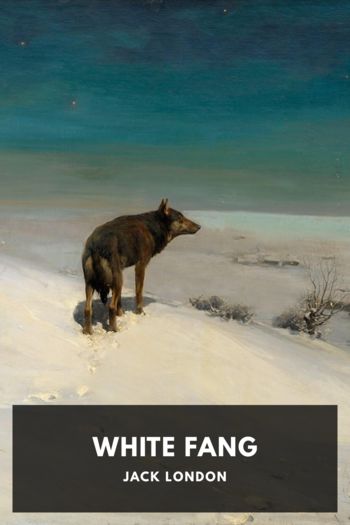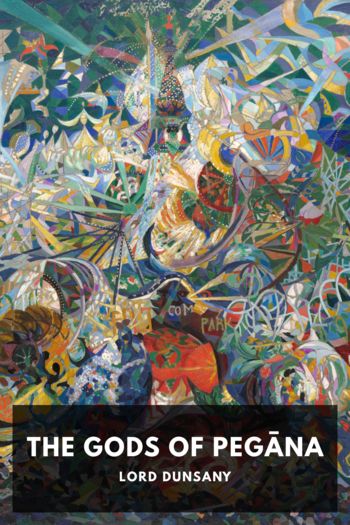White Fang, Jack London [story reading txt] 📗

- Author: Jack London
Book online «White Fang, Jack London [story reading txt] 📗». Author Jack London
He had no affection for Grey Beaver. True, he was a god, but a most savage god. White Fang was glad to acknowledge his lordship, but it was a lordship based upon superior intelligence and brute strength. There was something in the fibre of White Fang’s being that made his lordship a thing to be desired, else he would not have come back from the Wild when he did to tender his allegiance. There were deeps in his nature which had never been sounded. A kind word, a caressing touch of the hand, on the part of Grey Beaver, might have sounded these deeps; but Grey Beaver did not caress, nor speak kind words. It was not his way. His primacy was savage, and savagely he ruled, administering justice with a club, punishing transgression with the pain of a blow, and rewarding merit, not by kindness, but by withholding a blow.
So White Fang knew nothing of the heaven a man’s hand might contain for him. Besides, he did not like the hands of the man-animals. He was suspicious of them. It was true that they sometimes gave meat, but more often they gave hurt. Hands were things to keep away from. They hurled stones, wielded sticks and clubs and whips, administered slaps and clouts, and, when they touched him, were cunning to hurt with pinch and twist and wrench. In strange villages he had encountered the hands of the children and learned that they were cruel to hurt. Also, he had once nearly had an eye poked out by a toddling papoose. From these experiences he became suspicious of all children. He could not tolerate them. When they came near with their ominous hands, he got up.
It was in a village at the Great Slave Lake, that, in the course of resenting the evil of the hands of the man-animals, he came to modify the law that he had learned from Grey Beaver: namely, that the unpardonable crime was to bite one of the gods. In this village, after the custom of all dogs in all villages, White Fang went foraging, for food. A boy was chopping frozen moose-meat with an axe, and the chips were flying in the snow. White Fang, sliding by in quest of meat, stopped and began to eat the chips. He observed the boy lay down the axe and take up a stout club. White Fang sprang clear, just in time to escape the descending blow. The boy pursued him, and he, a stranger in the village, fled between two tepees to find himself cornered against a high earth bank.
There was no escape for White Fang. The only way out was between the two tepees, and this the boy guarded. Holding his club prepared to strike, he drew in on his cornered quarry. White Fang was furious. He faced the boy, bristling and snarling, his sense of justice outraged. He knew the law of forage. All the wastage of meat, such as the frozen chips, belonged to the dog that found it. He had done no wrong, broken no law, yet here was this boy preparing to give him a beating. White Fang scarcely knew what happened. He did it in a surge of rage. And he did it so quickly that the boy did not know either. All the boy knew was that he had in some unaccountable way been overturned into the snow, and that his club-hand had been ripped wide open by White Fang’s teeth.
But White Fang knew that he had broken the law of the gods. He had driven his teeth into the sacred flesh of one of them, and could expect nothing but a most terrible punishment. He fled away to Grey Beaver, behind whose protecting legs he crouched when the bitten boy and the boy’s family came, demanding vengeance. But they went away with vengeance unsatisfied. Grey Beaver defended White Fang. So did Mit-sah and Kloo-kooch. White Fang, listening to the wordy war and watching the angry gestures, knew that his act was justified. And so it came that he learned there were gods and gods. There were his gods, and there were other gods, and between them there was a difference. Justice or injustice, it was all the same, he must take all things from the hands of his own gods. But he was not compelled to take injustice from the other gods. It was his privilege to resent it with his teeth. And this also was a law of the gods.
Before the day was out, White Fang was to learn more about this law. Mit-sah, alone, gathering firewood in the forest, encountered the boy that had been bitten. With him were other boys. Hot words passed. Then all the boys attacked Mit-sah. It was going hard with him. Blows were raining upon him from all sides. White Fang looked on at first. This was an affair of the gods, and no concern of his. Then he realised that this was Mit-sah, one of his own particular gods, who was being maltreated. It was no reasoned impulse that made White Fang do what he then did. A mad rush of anger sent him leaping in amongst the combatants. Five minutes later the landscape was covered with fleeing boys, many of whom dripped blood upon the snow in token that White Fang’s teeth had not been idle. When Mit-sah told the story in camp, Grey Beaver ordered meat to be given to White Fang. He ordered much meat to be given, and White Fang, gorged and sleepy by the fire, knew that the law had received its verification.
It was in line with these experiences that White Fang came to learn the law of property and the duty of the defence of property. From the protection of his god’s body to the protection of his god’s possessions





Comments (0)